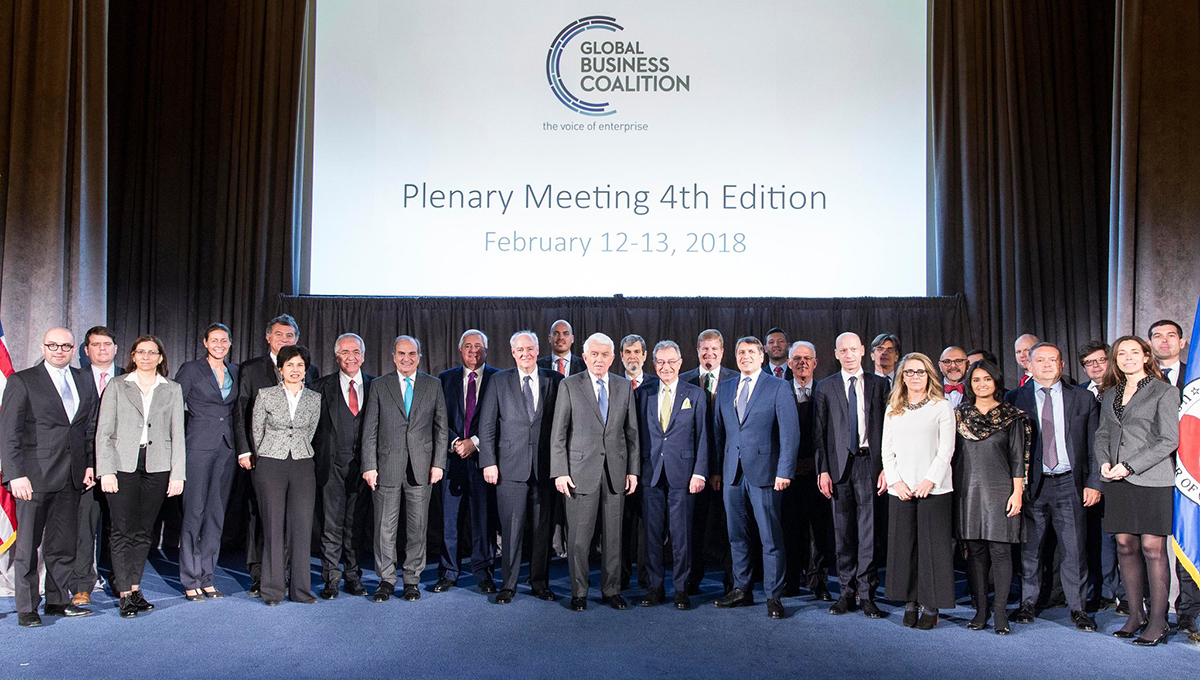BusinessEurope Headlines No. 2018-06
Leading international business organisations meet in Washington, D.C.
The 4th edition of the Global Business Coalition (GBC) plenary meeting took place on 12-13 February in Washington, D.C., hosted by the U.S. Chamber of Commerce. The members of the Coalition, including BusinessEurope, discussed among other topics the international business community’s priorities for 2018, global economic and political trends within the G20 economies. Business leaders also met the Secretary of US Treasury Steven Mnuchin and other representatives of the US administration to discuss the US policy developments and their impact on world affairs. Markus J. Beyrer, present at the meeting, commented: “Both the EU and the US should remain committed to the international trading system. We are very concerned that the key role of the World Trade Organisation could be damaged or undermined if the dispute settlement body is no longer operational. The US remains Europe’s major trading and investment partner and transatlantic relations should remain strong and driven by a positive agenda.”
Contact: Luisa Santos
Our comment
Transatlantic relations are key for the EU and the US
Eleonora Catella, Senior Adviser International Relations department
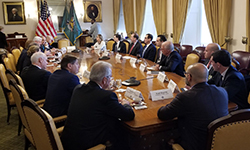
The EU and the US should remain committed to the international trading system. If the system is in need of reform, the EU and the US can work together with other like-minded partners to have better and more effective rules fit for today’s trade and investment reality. But the solution cannot be imploding the system or adopting measures that go against it. This will lead to unwanted effects that could spiral beyond control. These were among the topics discussed by BusinessEurope Director General Markus J. Beyrer during the plenary meeting of the Global Business Coalition in Washington, D.C on 12 and 13 February and also in the meeting with Secretary of US Treasury Steven Mnuchin and other representatives of the US administration. The US visit highlighted again the importance of the transatlantic relations and the need for the EU and the US to maintain a positive agenda and strong cooperation on issues of shared interest. The BusinessEurope delegation also had a meeting with the EU Ambassador in the US David O’ Sullivan.
European business is looking forward to engaging further in areas ranging from energy to the digital economy and infrastructure. The US remains Europe’s major trading and investment partner, so the focus should be on trade and investment, too. We remain committed to a strong bilateral relationship, and to a positive and greater impact that a concerted EU-US approach could have, whether in the application of international sanctions or trade remedies, or in tackling new challenges in the field of intellectual property rights.
European businesses are deeply concerned with the broader consequences that can be expected should the dispute settlement body of the World Trade Organisation no longer be operational after summer, undermining the key role of the organisation. The EU and the US have been at the genesis of the world trading system and they have major responsibilities in ensuring it remains effective.
The US tax reform was another topic high on the visit’s agenda. The completion of the US tax reform is a major achievement, with many provisions in the bill likely to make the tax system less complex and to encourage companies to invest and expand. We recognise the boost this can give to global economic growth. However, there are two provisions in the tax bill, namely the Base Erosion and Anti-Abuse Tax (BEAT) and the Foreign-Derived Intangible Income (FDII) regime that are raising some concerns. We believe it is essential to maintain WTO and OECD rules to keep a positive climate for global trade.
The EU and the US should also maintain a strong cooperation on issues related to Foreign Policy and Defence. This is particularly important in the area of sanctions where a strong coordination in the scope and implementation is critical for European business.
Contact: Eleonora Catella
Digital Taxation discussion with European Commission
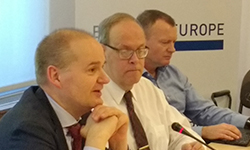 “Any initiatives regarding digital taxation must both respect member states' competences to set their own tax policies, and be developed on the basis of global taxation principles”. This was the key message of the Tax Policy Working Group during a meeting with Bert Zuijdendorp, Head of Unit of Company Taxation Initiatives at the European Commission’s DG TAXUD on 13 February. Following a discussion on the Commission’s recent work on corporate taxation and in particular digital taxation, the group also noted that it is essential that any proposals on digital taxation are agreed internationally through the OECD to be possibly implemented in a common and coordinated manner at a European and global level. This will ensure European companies' competitiveness and guarantee a global level playing field. The group awaits the Commission’s further proposals on digital taxation, expected by the end of March.
“Any initiatives regarding digital taxation must both respect member states' competences to set their own tax policies, and be developed on the basis of global taxation principles”. This was the key message of the Tax Policy Working Group during a meeting with Bert Zuijdendorp, Head of Unit of Company Taxation Initiatives at the European Commission’s DG TAXUD on 13 February. Following a discussion on the Commission’s recent work on corporate taxation and in particular digital taxation, the group also noted that it is essential that any proposals on digital taxation are agreed internationally through the OECD to be possibly implemented in a common and coordinated manner at a European and global level. This will ensure European companies' competitiveness and guarantee a global level playing field. The group awaits the Commission’s further proposals on digital taxation, expected by the end of March.
Contact: Pieter Baert
Discussing the review of the EU SME Definition
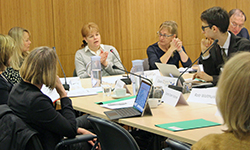 It is vital to revise the EU SME Definition so that it does not anymore prevent some SMEs from benefitting from the reduced REACH registration fee or from other SME-geared lighter regulatory regimes. This was one of the messages passed by BusinessEurope’s SME Committee, chaired by Anna-Lena Bohm (CEO Uniguide), at the meeting with Maarit Nyman, Deputy Head of the COSME programme and SME policy unit, DG GROW, European Commission (13 February). The current SME definition may discourage SMEs from seeking private investment (Venture Capital) and this should be addressed. The discussion covered also the evaluation of COSME (the EU programme for enhancing the competitiveness of SMEs) and the outlook for future Commission initiatives in the area of SME support.
It is vital to revise the EU SME Definition so that it does not anymore prevent some SMEs from benefitting from the reduced REACH registration fee or from other SME-geared lighter regulatory regimes. This was one of the messages passed by BusinessEurope’s SME Committee, chaired by Anna-Lena Bohm (CEO Uniguide), at the meeting with Maarit Nyman, Deputy Head of the COSME programme and SME policy unit, DG GROW, European Commission (13 February). The current SME definition may discourage SMEs from seeking private investment (Venture Capital) and this should be addressed. The discussion covered also the evaluation of COSME (the EU programme for enhancing the competitiveness of SMEs) and the outlook for future Commission initiatives in the area of SME support.
![]() Contact: Daniel Cloquet
Contact: Daniel Cloquet
Updates on Capital Markets Union
 The Deputy Head of Unit Capital Markets Union at the European Commission Directorate-General for Financial Stability, Financial Services and Capital Markets Union, Jung-Duk Lichtenberger, attended the meeting of the BusinessEurope’s Financial Affairs working group on 7 February. He gave an overview of the measures taken and planned to create a Capital Markets Union to improve the availability of finance for firms. Significant new proposals to encourage cross-border investment are expected in the spring.
The Deputy Head of Unit Capital Markets Union at the European Commission Directorate-General for Financial Stability, Financial Services and Capital Markets Union, Jung-Duk Lichtenberger, attended the meeting of the BusinessEurope’s Financial Affairs working group on 7 February. He gave an overview of the measures taken and planned to create a Capital Markets Union to improve the availability of finance for firms. Significant new proposals to encourage cross-border investment are expected in the spring.
Contact: Erik Berggren
Furthering Europe’s Cybersecurity Capacities
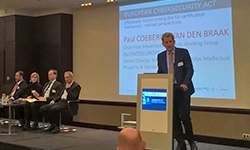 Certification schemes in the cybersecurity act should remain voluntary and the act should detail when industry is consulted. These were the key messages of Paul Coebergh van den Braak, Chair of BusinessEurope’s Free Movement of Goods Working Group, on 13 February at a conference organised by European Standardisation Organisations in cooperation with the EU Agency for Network and Information Security (ENISA) on the Cybersecurity Act. The proposed regulation is currently under discussion in Parliament and Council. “In order to ensure cyber secure conditions, public and private actors should cooperate to develop dynamic schemes,” stressed Coebergh van den Braak in his address, “it also is key to promote awareness to minimise human error in security incidents.” Businesses take cybersecurity seriously. That is why we have continually invested in understanding and limiting cyberattacks as a key part of our business models.
Certification schemes in the cybersecurity act should remain voluntary and the act should detail when industry is consulted. These were the key messages of Paul Coebergh van den Braak, Chair of BusinessEurope’s Free Movement of Goods Working Group, on 13 February at a conference organised by European Standardisation Organisations in cooperation with the EU Agency for Network and Information Security (ENISA) on the Cybersecurity Act. The proposed regulation is currently under discussion in Parliament and Council. “In order to ensure cyber secure conditions, public and private actors should cooperate to develop dynamic schemes,” stressed Coebergh van den Braak in his address, “it also is key to promote awareness to minimise human error in security incidents.” Businesses take cybersecurity seriously. That is why we have continually invested in understanding and limiting cyberattacks as a key part of our business models.
![]() Contact: Patrick Grant
Contact: Patrick Grant
Calendar
- 20-21 February: Circular Economy Stakeholder Conference
- 22-23 February: Second European Industry Day
- 23 February: Informal meeting of Heads of State or Government
- 23-24 February: Informal European Council
- 28 February: European Semester Winter Package
- 1 March: BUSINESSEUROPE Day 2018 (upon invitation)
